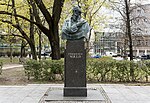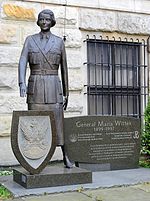Museum of the Earth of the Polish Academy of Sciences
Geology museums in PolandMuseums established in 1948Museums in WarsawNatural history museums in PolandPolish Academy of Sciences

The Museum of the Earth in Warsaw (pol. Muzeum Ziemi PAN w Warszawie), established in 1948 and continuing a tradition initiated by Earth Museum Society back in 1932, has been operating within the structure of the Polish Academy of Sciences since 1959. The Museum of the Earth is located in two historical buildings at Na Skarpie Avenue in the center of Warsaw, perched on high Vistula escarpment.
Excerpt from the Wikipedia article Museum of the Earth of the Polish Academy of Sciences (License: CC BY-SA 3.0, Authors, Images).Museum of the Earth of the Polish Academy of Sciences
Aleja Na Skarpie, Warsaw Śródmieście (Warsaw)
Geographical coordinates (GPS) Address Nearby Places Show on map
Geographical coordinates (GPS)
| Latitude | Longitude |
|---|---|
| N 52.229166666667 ° | E 21.028611111111 ° |
Address
Muzeum Ziemi PAN
Aleja Na Skarpie 20/26
00-488 Warsaw, Śródmieście (Warsaw)
Masovian Voivodeship, Poland
Open on Google Maps










